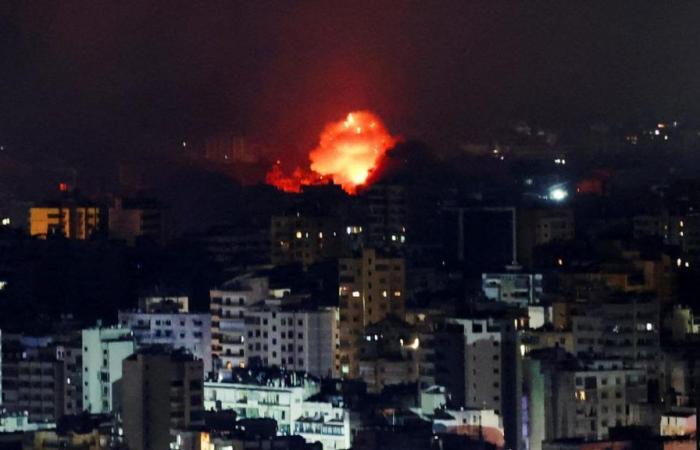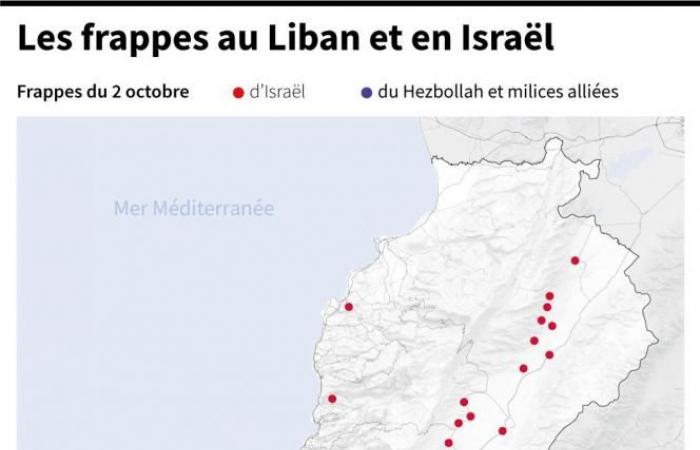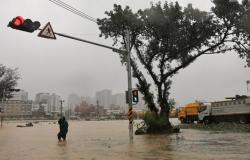“Hassan Jaafar al-Qasir, son-in-law of Hassan Nasrallah, is one of the two Lebanese victims of the Israeli raid which targeted an apartment in a residential building in the Mazzé district of Damascus,” said the Syrian Observatory for Human Rights. ‘man.
A source close to Hezbollah confirmed this information to AFP and specified that Hassan Jaafar al-Qasir was the brother of Jaafar al-Qasir, responsible for the transfer of weapons from Iran to Lebanon, which Israel announced it had killed Tuesday in a strike on the southern suburbs of Beirut.
Iran launched its second direct attack against Israel on Tuesday, followed by threats of cross-retaliation between the two countries.
“Iran has made a serious mistake (…) and will pay the price,” warned Israeli Prime Minister Binyamin Netanyahu.
US President Joe Biden assured Wednesday that the United States would oppose Israeli strikes against Iranian nuclear facilities, after reaffirming his full support for Israel the day before.
Iranian President Massoud Pezeshkian, for his part, promised “a stronger response” in the event of reprisals, while assuring that his country was not “seeking war”.
Also read
Defense is preparing for an operation to evacuate Belgians from Lebanon
The military escalation between Israel on the one hand, Iran and Hezbollah on the other, raises fears that the situation in the Middle East could spiral out of control, a year after the unprecedented attack carried out by Palestinian ally Hamas of Hezbollah, on Israeli soil, which started the war in the Gaza Strip on October 7, 2023.
The Secretary General of the UN, Antonio Guterres, castigated on Wednesday “the sickening cycle” of violence in a region on the edge of the “precipice”, before the Security Council meeting urgently.
World Health Organization boss Tedros Adhanom Ghebreyesus warned on X that Lebanese hospitals were “overwhelmed with injured patients”. “The health system has been weakened by successive crises and is struggling to cope with the immense needs,” he added.
According to the Lebanese Crisis Center, more than 1,928 people have been killed in Lebanon since October 2023.
Since mid-September, Israel has intensified its military operations on the northern front, in order to weaken Hezbollah and allow the return of tens of thousands of inhabitants of the border regions with Lebanon displaced by the rocket fire of the Lebanese movement, incessant since one year.
“Ghost Town”
The Israeli army announced on Wednesday the death of eight soldiers, killed since the start of its ground operations on Monday, which it describes as “limited”, in southern Lebanon.
The Israeli army called for the “immediate” evacuation of villages in southern Lebanon while new airstrikes targeted the southern suburbs of Beirut, deserted by its residents.
Three new strikes hit these neighborhoods Wednesday evening, according to witnesses and the AFP.
“The neighborhood has become a ghost town,” testified Mohammad Cheaïto, a 31-year-old driver who decided to stay but asked his parents, his sister and his nephews, who had fled southern Lebanon to take refuge with him , to leave for a safer place.
Also read
“Syrian refugees from Lebanon return to Syria because they have no other options”
Images released by the Israeli army show soldiers on Lebanese soil, moving on foot through villages and mountainous areas. The army announced that it had deployed a second division to support the troops already there.
In Lebanon, more than 1,000 people have been killed, according to the Ministry of Health, since the explosions of Hezbollah transmission devices on September 17 and 18, attributed to Israel, and the start of massive aerial bombardments on September 23. which mainly targeted the south and east of the country as well as the southern suburbs of Beirut.
The government on Wednesday estimated the number of people displaced by the bombings at around 1.2 million.
The “heart” of Israel targeted
At the same time, Israel and Tehran exchanged threats after the massive attack launched Tuesday by Iran to avenge the death of Hassan Nasrallah and that of Hamas leader Ismaïl Haniyeh, killed on July 31 in an attack in Tehran, blamed on Israel by Iran and Hamas.
Around 200 missiles were fired by Tehran, a large number of which were intercepted by the anti-missile system, said the Israeli army, which benefited from the support of American and British forces, according to the Pentagon and London.
This attack, the second since April, injured two people in Israel and killed a Palestinian in the occupied West Bank, according to emergency services and a Palestinian official.
Also read
After the Iranian missile attack, anxiety grips the Middle East
“This is not going to end well”, “restraint is not Mr. Netanyahu’s strong point,” political analyst Jordan Barkin commented for AFP.
In Tehran, Mansour Firouzabadi, a 45-year-old nurse, said he was “really worried”, hoping “that the United States will stop supporting Israel and that Israel will not retaliate”.
The armed wing of Hamas also claimed responsibility on Wednesday for an attack committed the day before in Tel Aviv, in which seven people were killed with automatic weapons and knives.







